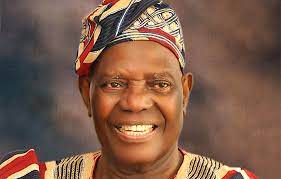In a shocking revelation, former governor of Osun State, Chief Bisi Akande, has raised concerns about the unresolved assassination of Nigeria’s former Attorney General and Minister of Justice, Chief Bola Ige, claiming that Rashidi Ladoja, former governor of Oyo State, could have significant information about the murder.
This is coming two decades after the brutal assassination of Chief Bola Ige, who was assassinated on December 23, 2001, at his Ibadan, Oyo State residence.
In an explosive interview with the ace broadcaster, Edmund Obilo, in Ibadan, which was released at the weekend, Akande lamented that key figures who might have shed more light on the case, including a former Oyo State governor, Lam Adesina, had died.
He said, “There are many things that die with people. I know Lam Adesina went to court over the matter, and I also know his successor, (Rashidi) Ladoja, withdrew the case. Ask Ladoja; he would know more about Bola Ige’s death.

“I was the Chief Security Officer of Osun State at the time, not Oyo State. Lam Adesina was the Chief Security Officer of Oyo State, and he went to court, and the governor who took over from him, Ladoja, withdrew the case from court. He might be able to tell you more. I believe he has more information on Bola Ige’s death.”
Akande also expressed regret that Adesina had confided in him about certain details he could no longer disclose.
“Because there are many things you don’t want to tell the public. I don’t want to tell anybody.
“Now Bola Ige is dead, and Lam Adesina too is dead, so who will be my witness? Nobody,” he said.
“I know Lam Adesina went to court on the matter, and Ladoja withdrew the case from court. Ask Ladoja; he would know more about Bola Ige’s death.
Also Read:
- Ex-presidential aide advocates death penalty to combat corruption in Nigeria
- UBA Knowledge Series: Experts guide SMEs on effective documentation amid new tax regime
- Egbetokun: Elongation may weaken police structure — MURIC
- Another gaffe by Obasanjo: Putting historical records straight, by Wale Adedayo
- Parents require TCC to benefit from free WAEC registration — Lagos
Despite being a chieftain of the opposition Alliance for Democracy (AD), former President Olusegun Obasanjo, who led a PDP-led government, appointed Bola Ige as Minister of Mines and Power (1999–2000).
However, after failing to significantly improve the National Electric Power Authority (NEPA), he was reassigned as Minister of Justice and Attorney General of the Federation (2000–2001).
Akande claimed that Bola Ige regretted joining Olusegun Obasanjo’s administration, calling it a “kiss of death,” but maintained that the decision was a collective one made by Afenifere and the Alliance for Democracy (AD), adding that Obasanjo had sought to form a Government of National Unity and consulted Ige to be part of it.
He said, “I wouldn’t say it’s a mistake. We supported him in joining the government, I mean the Afenifere and the Alliance for Democracy.
“We met under the leadership of (Ayo) Fasanmi in AD. We met under the leadership of Abraham Adesanya in Afenifere, and we asked Bola Ige to join the government.
“Abraham Adesanya asked that we discuss the matter in the AD, and we met under Fasanmi, the chairman of AD in the South-West, and by acclamation, we asked Bola Ige to join the government.
“We supported him in joining the government. We met under the leadership of Ayo Fasanmi in AD and Abraham Adesanya in Afenifere, and we asked Bola Ige to join. It was a unanimous decision.”
“Obasanjo met Bola Ige and asked him to join his government. Ige asked Obasanjo to tell his party.
“Before Obasanjo would inform the party, Ige himself had told the party and we debated it and asked him to go and join.
“If anything so happens, we are all responsible. It was a joint decision. We held a meeting at Ijebu-Igbo, and we were unanimous, asking him to go.
“We held another meeting at AD and by acclamation, we asked him to go and join.
“So if asking Bola Ige to join Obasanjo was a mistake, it’s a mistake of the Yoruba AD and Afenifere.”
Akande recounted a conversation he had with Bola Ige when Ige considered resigning from Obasanjo’s administration, warning him against the decision.
“One evening, he just called me and said, ‘I’m going to resign from this government.’ I said, ‘Please, sir, I will come back to you.’. I called his friend, Oluwole Rotimi.
“He asked me to advise him (Ige) not to resign because if he does, he’s likely going to die,” Akande said.
“I called Uncle (Ige) back and begged him not to resign. He said he had talked to Wole Soyinka and Bola Tinubu, and both of them had asked him to resign. I asked him not to resign. I then said, ‘You can go to Obasanjo, tell him what you are angry about, and tell him that if he doesn’t want you again, this is your letter.’
“He actually did so. Obasanjo asked what he wanted him to do, and they both agreed. When he was leaving, Obasanjo said, ‘Don’t give that letter to the press; give it to me,’ and he dropped the letter. Ige told me himself. It was later after that he was moved to the Ministry of Justice.
Akande emphasized that Bola Ige’s murder was politically motivated and accused the Obasanjo administration of showing little interest in bringing Ige’s killers to justice.
“He was killed in anticipation of what he might become in the future. It was a state murder. The government killed him. The government can kill anybody.
“Obasanjo wasn’t keen on investigating who killed Bola Ige but was interested in the stability of himself in power and possible continuance.”


